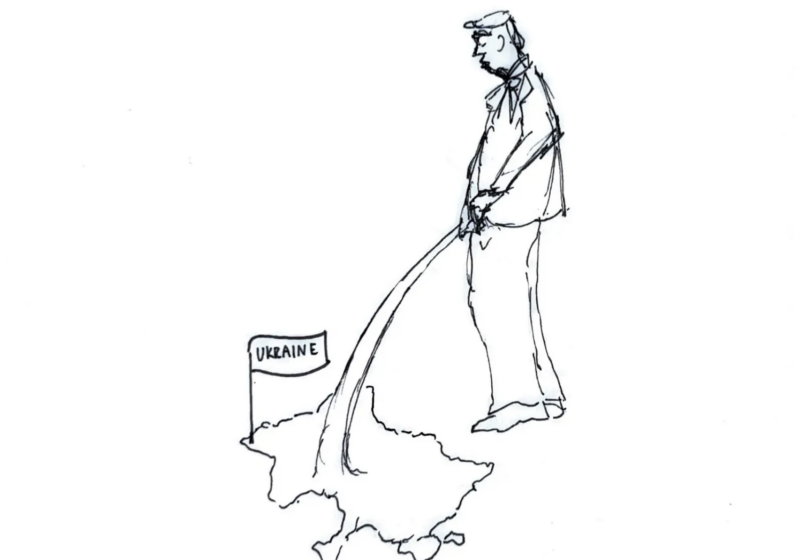Trigger Warning: “Carousel” is a show which contains themes of violence, suicide, and domestic abuse, which this review touches on and discusses throughout.
To pull it together in a single word, Roger and Hammerstein’s “Carousel” is one thing: intense.
The show features both the themes and technicality of a Golden Age musical: a plot complex with matters of domestic abuse and suicide, a score rich with soaring vocals and a sweeping orchestra, and the creative floor to reinvent the musical to a new age, stage, and social scene. For senior and “Carousel” director Rey Hankinson, this was exactly the challenge they wanted to take on.
“It was through this show that I fell in love with the craft [of musical theater]… and I am beyond grateful and excited to tell this story through my own lens,” said the program’s director’s statement. Particularly for a show staged so far in the past (originally released in 1945, for reference), their adaption worked to challenge the actors, production team, and the original themes of the show. “The subject matter clearly demands our actors to think deeply about their characters, and […] each challenge represents a new skill that our organization has the privilege to…tackle.”
Following the story of carousel barker Billy Bigelow (senior Chris Riveros) and his relationship with local millworker Julie Jordan (sophomore Isabella Briggs), “Carousel” presents a fascinating turning wheel between moments of high gravity and high camp. While the show’s primary storyline grapples with the descent of Bigelow’s character into the cycle of paternal abuse and absenteeism, the town that the story wraps around is full of life, love, and seaside splendor.
From the get-go, it’s evident that “Carousel” boasts of a strong ensemble with crystal clear talent. Played by sophomore Annika Almquist, a young Carrie Pepperidge opens the show with the vocal sanctity of Snow White, introducing the audience to the much-needed thread of her and Julie Jordan’s friendship. Making her ROC Players debut this semester, Briggs and her portrayal of Jordan are also quick to shine on the May Room stage. In an arc subject with both the romance and wrongdoings with Billy Bigelow, her character and interpretation are powerful, and neededly so. Throughout the performance, she floats from sweet soprano highs of songs like “If I Loved You” to the emotional drain of Act II following Bigelow’s abuse and suicide — a daunting and incredibly moving feat to perform.
An overarching presence in the production as a whole, Billy Bigelow’s character is tough to nail, yet one that Riveros performs with great precision and intensity. Bigelow is a man ridden with grief and deep self-loathing, which is reflected in his abuse towards peers and family both on Earth and beyond the grave. While he’s a person wrapped in layers of hatred and hurt that he takes out on the world around him, he still is a person — and Riveros conveyed this in his rich, refined performance. While the audience can’t fully understand Bigelow’s actions, they can resonate with his character, a harrowing and emotional challenge for any actor taking on the part. In an interview with Campus Times, Riveros cited “Soliquicy” as a song which reflected his journey in playing Billy Bigelow. “Soliquicy” was Act I’s closing number, which proved just as moving as it was petrifying to watch, and was a solo which greatly showcased Riveros’ vocal and emotional prowess as he dug deep into the character onstage.
While original productions end Bigelow’s arc with a one-way ticket to heaven upon redeeming his abuse to the angels after death, ROC Players worked to readapt this ending to give consequence to his abusive behavior and lack of change. While his final destination is unspecified, there’s no glorification or quick forgiveness for any of his actions — all that’s needed to respin the ending in a new light.
“In the year of 2023 it just doesn’t reflect,” says Riveros on Bigelow’s intended symbolism to the children lost to WWII only offered redemption in the eyes of blessings above. “It’s important to reevaulate art under [a] fluid guise instead of trying to keep [it] as it is.”
To Briggs, Julie’s decision to stick with Bigelow despite her knowledge of his abusive past and present is an act of rebellion, a stand against the patriarchal world around her which attempts to dictate her life and love. “She picks the wrong hill to die on, that hill being Billy,” she says, reflecting on the character’s motives. While Jordan understands her mistakes and the hardships of living a life with the shadow of her late-husband, she strives to live without regret and without remorse, the final act of her unbreakable spirit.
As much as “Carousel” circles around this heavier storyline, the production maintained a playfulness that kept a flow of energy even in the most still of times. Townswoman Arminy (sophomore Sasha Lifchez) flirts with and floats between the sailors of the town with each new scene, professors and production team members make cameos just before the Final Ultimo, and the ensemble’s chemistry works to give the town a heartbeat that pulses from the first notes to final bows.
The cast welcomed players new and old, and offered a space for community both on and off the stage. Reflecting on his debut to ROC Players, senior Jack Moore says he has loved “being involved in a production of a show that embraced the camp of musical theater,” particularly as it encouraged viewers to think more critically about the show itself As an ensemble, the cast worked as a machine to break down this dichotomy. Led by vocal powerhouse and junior Angelina Severino in her depiction of Nettie Fowler, Act II opener “A Real Nice Clambake” proved a testament to their harmony both in vocal and troupe technique before delving into the more jarring branches of Act II. Meanwhile, more individual moments, particularly the humor in senior Dominique Neveu’s Jigger Craigin (to which I quote with such sincerity and contemplation: “My mother had a baby once”), reflected the precision in bringing moments of light to the darker storyline.
Beyond the stunning range of vocals and acting showcased throughout the performance, “Carousel” used movement to a potential as full as the story it wished to tell. The set itself was raw — with defined platform levels and a carousel that exists only in the mind’s-eye — but it served as a playground for the cast as they spun through time, space, and emotion. Along with blocking that transformed the stage from the Carousel grounds to Nettie Fowler’s oceanfront home and the pearly gates of heaven, the show’s choreography (arranged by senior Sophia Krackov) progressed its storytelling beyond what words could dare to convey. Accompanied by the resilient ROC Players pit orchestra, each act swells through its dancing — from the opening Carousel Waltz to the toe-tapping sailor stomp of “Blow High, Blow Low” — a personal highlight of the show.
Profound both in technicality and endurance, the second act features “Ballet”: a 10-minute long dance of whimsy and woe from Bigelow’s future daughter, Louise. Performed with sophomore Kristen Lipp, the movement occurs after Billy’s suicide and state of limbo at the pearly gates — making her crystalline smile all the more impressive at a time when the audience could barely dare to breathe. “It’s a lot of face and posture,” said Lipp on perfecting her performance, even comparing it to an act of mime as opposed to simply acting without words. “It’s sometimes really scary, but…really therapeutic…to emote after [the emotions] in tech week.”
As a performance charged in both its energy and musicality, ROC Players’ “Carousel” breaks down and resets expectations for student theater on campus, and serves as a showcase of technicality on all levels from both cast and production. While the musical grapples with a storyline heavy to perform and heavier to swallow, the visions and collaboration of the cast and production team work it beyond its libretto to what art should be. It’s an affliction to the comfortable, comfort to the afflicted, and so much more to all whom it reaches.






